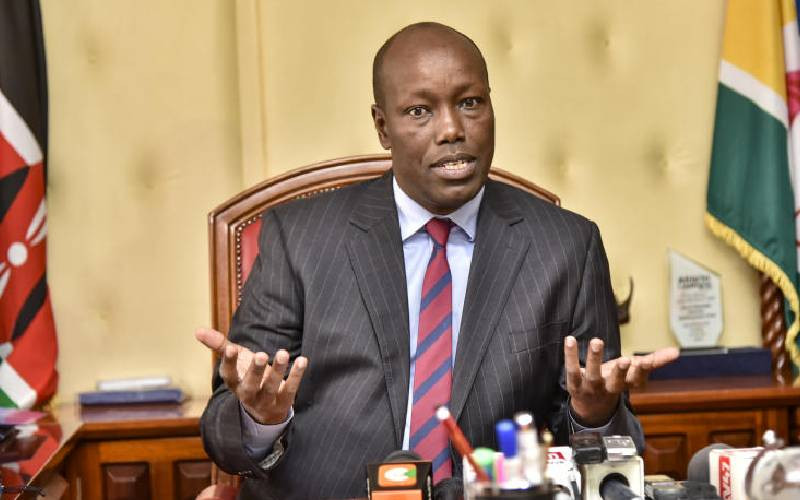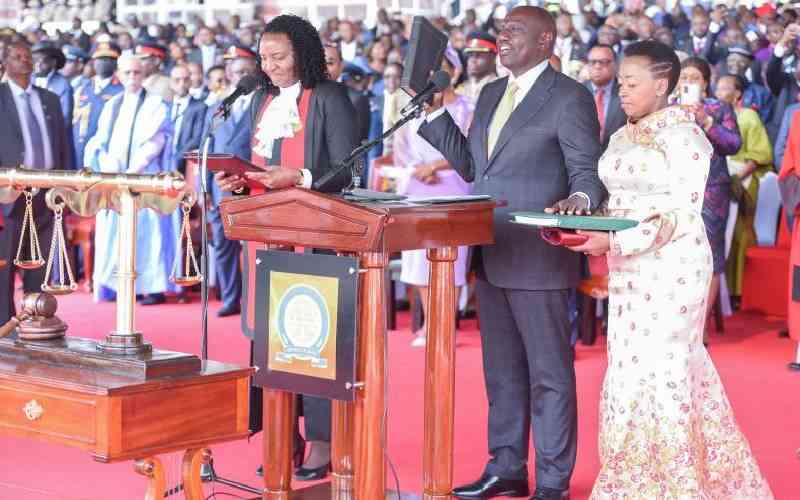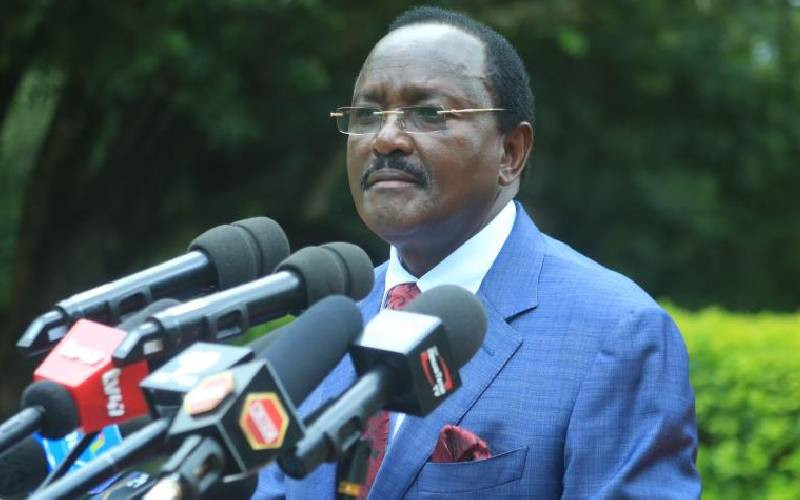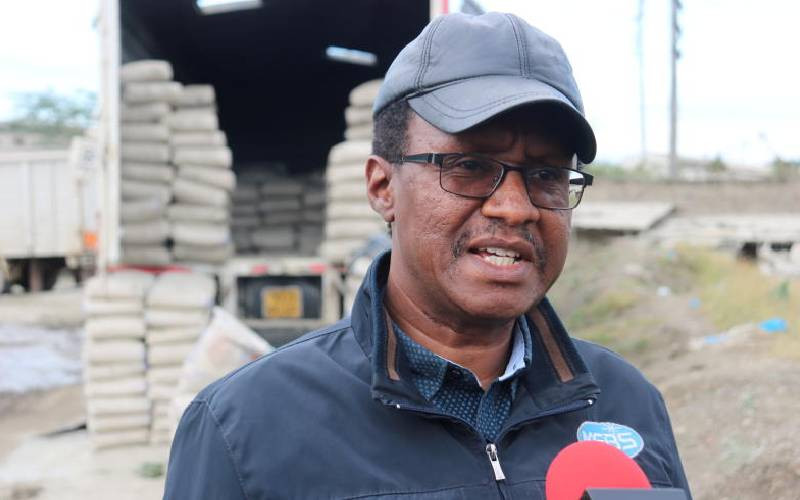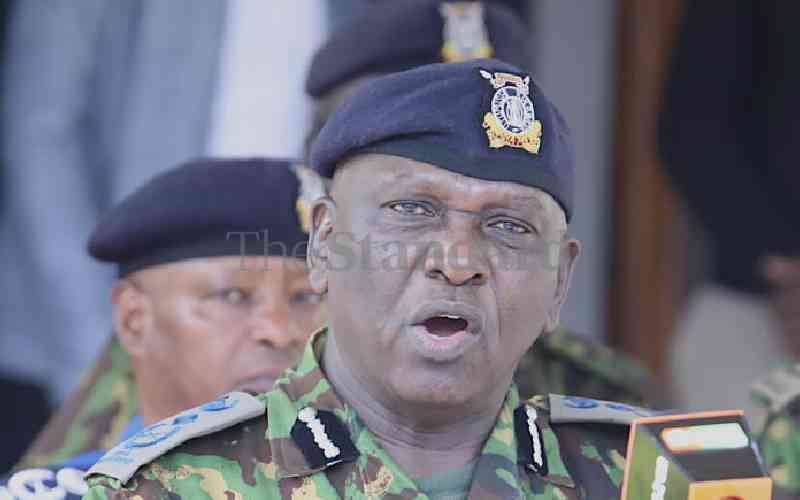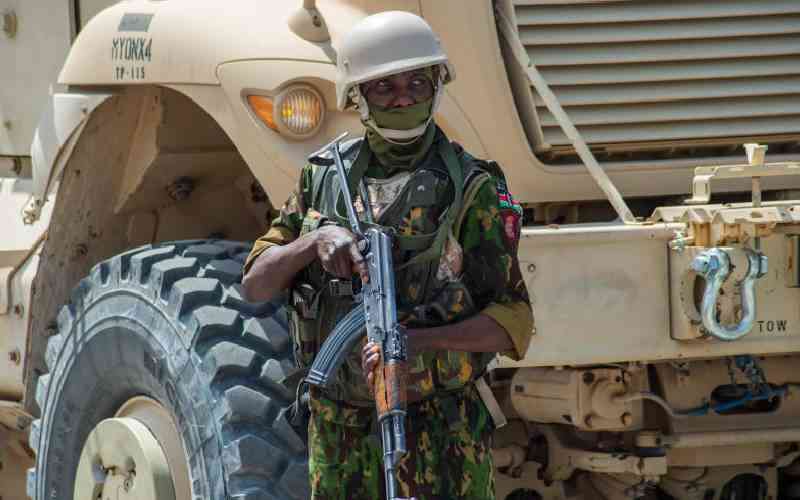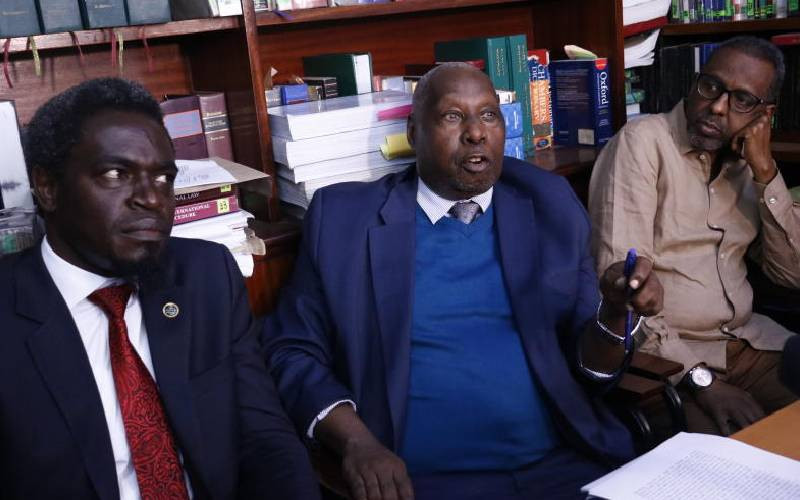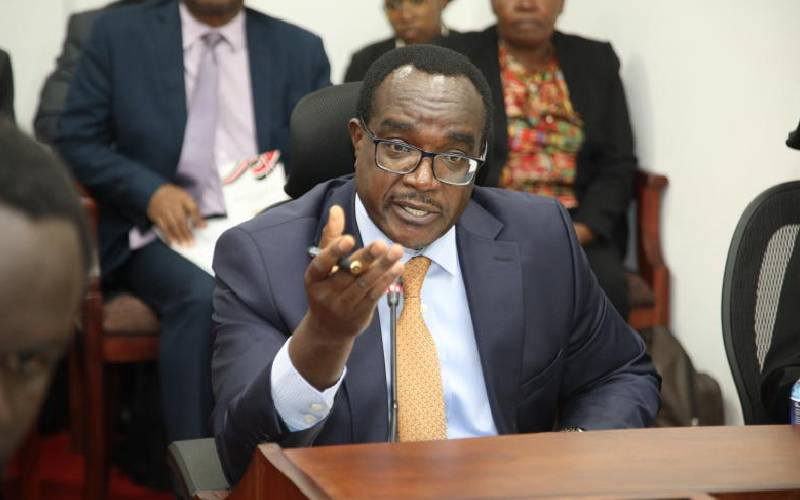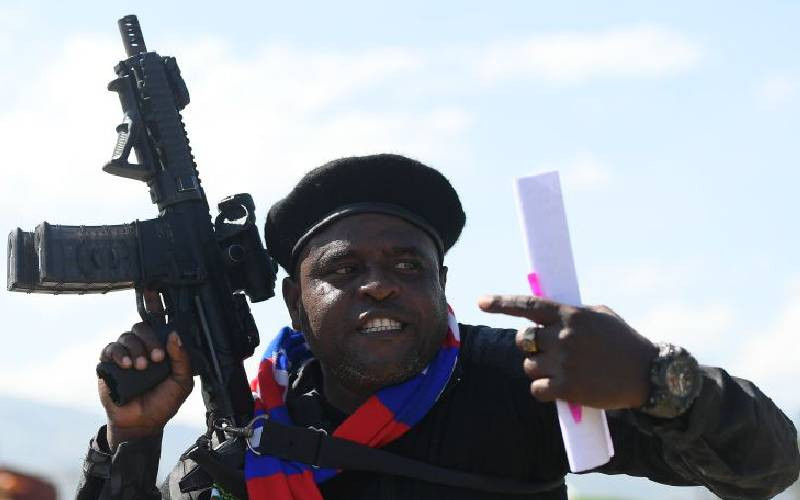
In the days following an approval by the United Nations for Kenya to send its police officers to Haiti to restore order in a country that has been run over by armed gangs, its most feared gang leader, Jimmy Cherizier, led a protest against the deployment.
Flanked by dozens of heavily armed men under his command, Cherizier, a former police officer turned leader of the internationally known and locally dreaded G9 Family and Allies gang, led a protest in the streets of Port-au-Prince against the UN and American-backed Kenyan-led stabilisation mission.
"We will fight against them until our last breath," Cherizier warned the Kenyan police should they set foot on Haitian soil.
"We are launching the fight to overturn Ariel Henry's government in any way," Cherizier said of Haiti's prime minister, who took power after President Jovenel Moise was assassinated in 2021. "Our fight will be with weapons," the gang leader told Reuters.
Nicknamed 'Barbeque' due to his practice of burning his victims alive, Cherizier, who was sanctioned by the UN in October last year, has become one of the faces of the multi-layered issues plaguing the poor Central American country.
He has been linked to various human rights violations and attacks against civilians, according to multiple reports by media outlets, international observers and rights groups.
Cherizier's biggest move against the American-backed Haitian government is a blockade by his G9 gang on a major fuel terminal at Port-au-Prince since last year, which has led to countrywide fuel shortage and a flourishing black market.
Port crisis
"If Ariel Henry resigns at 8:00, then at 8:05, we remove all the barricades, so the trucks can come to the fuel depot and fill up, and then the crisis will stop," Cherizier told Al Jazeera vowing not to open the fuel depots until the president leaves office or else they will take power by force.
Should the courts clear, Kenya's deployment of security forces to lead a pacifying mission in Haiti next year, Berbeque's gang is just one of the more than 200 gangs that Kenya's security forces hope to neutralise.
Haiti's decades of gang violence have been well documented due to the long history of bloody coups and political instability. The tiny Caribbean county of about 11 million people was born of violence when African slaves overthrew their French masters in 1804.
Why the violence has refused to die down more than two centuries after Haiti's independence and how Kenya, a country 12,000km away with its own security challenges, has been sucked into a 200-year-old war, is a puzzle.
According to the World Bank, "Haiti remains the poorest country in the Latin America and the Caribbean (LAC) region and among the poorest countries in the world. In 2022, Haiti had a GDP per capita of $1,745.9."
"Amid the lingering political and institutional crisis, high vulnerability to natural hazards, coupled with violent gangs vying to gain control over business districts, the economy contracted for four consecutive years by 1.7 per cent in 2019, 3.3 per cent in 2020, 1.8 per cent in 2021, and 1.7 per cent in 2022," said the World Bank in its October brief about Haiti, adding that its economy is "expected to contract by 2.5 per cent this year."
Once the wealthiest colony in the Americas, Haiti is now the Western Hemisphere's poorest country, with more than half of its population living below the World Bank's poverty line.
Vulnerable countries
"Haiti remains one of the most vulnerable countries worldwide to natural hazards, mainly hurricanes, floods, and earthquakes. More than 96 per cent of the population is exposed to these types of shocks," says the World Bank.
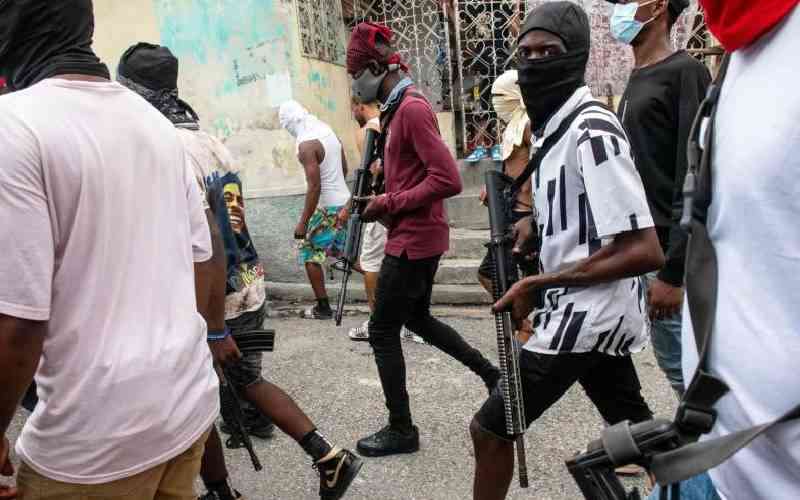
"A child born today in Haiti will grow up to be only 45 per cent as productive as they could be if they enjoyed full access to quality education and healthcare," says the World Bank.
However, to understand how Kenya has been drawn in to fight a war that no one, including the UN and US with their heavy firepower, wants to get involved with, one needs to get a deeper understanding of how Haiti got to where it is now.
Haiti is the world's oldest black republic and one of the oldest republics in the Western Hemisphere.
In the current list of failed states, which includes Yemen, Somalia, Syria, South Sudan, Central African Republic, DR Congo, Sudan, Afghanistan, Chad, and Myanmar, only Haiti which is located in the Americas.
Shunned by many nations, straddled with massive debt and reeling with corruption and political instability, Haiti has in the last two and a quarter centuries snowballed into one of the planet's biggest man-made humanitarian disasters.
Like all failed states, Haiti's catastrophe has largely been caused by interference in its political systems by powerful countries who fought for their interests in the island nation. All of them meddled in its internal affairs for far too long before attempting to drop off when it was too late.
The Haiti situation worsened from the day it became independent on January 1, 1804. A 13-year bloody revolution led by former slave Jean-Jacques Dessalines forced the French to grant Haiti independence after more than 400 years of European occupation.
It was the first independent nation of Latin America and second in the Americas after the US.
But if the former African slaves thought that their problems had ended with the exit of the French, they were very wrong. Western nations who were at the time enforcing brutal, racist colonial systems around the world immediately treated Haiti as a pariah.
In July 1825, two decades after Haiti declared its independence, French King Charles X who could not believe his countrymen had been chased away by slaves sent warships to Port-au-Prince with a message that the young nation would have to pay France "150 million francs as indemnity for its independence to be recognised by France".
American loans
The amount was too much for Haiti to pay off so it took out loans from American and French banks at hefty interest rates to pay off over 122 years. Various studies indicate Haiti paid France an equivalent of today's $20 billion to $30 billion.
This unfair compensation to France for Haiti's independence has over the last two centuries had significant and lasting repercussions.

It has also played a huge role in destabilising the nation's finances, sucking up over 80 per cent of revenue while serving as a tool for foreign powers to undermine Haiti's sovereignty.
Between 1911 and 1915, seven presidents were assassinated or overthrown in Haiti. The assassination of President Vilbrun Guillaume Sam in 1915 offered a pretext for the US, which had loaned Haiti millions of dollars to offset French loans, to intervene.
On the day of Sam's murder, July 28, 1915, President Woodrow Wilson authorised the invasion of Haiti by the American warship, USS Washington. This occupation lasted until 1934, during which time the US exerted significant control over Haiti's affairs.
The invasion ended with the Haitian-American Treaty of 1915. The articles of this agreement created a Haitian gendarmerie, essentially a military force made up of Americans and Haitians and controlled by the US Marines. The US also gained complete control over Haitian finances, and the right to intervene in Haiti whenever necessary.
The US government also forced the election of a new pro-American President, Philippe Dartiguenave, by the Haitian legislature in August of 1915. Since then, Haiti has not known peace, despite numerous interventions by the international community.
Interventions
In 30 years, US troops have intervened in Haiti three times: in post-coup invasions in 1994 and 2004, and to quell feared unrest after an earthquake in 2010. The US outsourced its interventions to other countries' troops. This began with a UN mission from 1993 to 1997, and then a Brazilian-led multinational force from 2004 to 2019.
Interventions have been so catastrophic that the US ambassador to Haiti resigned in September 2021.
Moise was the hand-picked successor of Michel "Sweet Micky" Martelly, a popular singer-turned-right-wing nationalist who became president thanks to the electoral interference of the Obama administration in the post-2010 earthquake election.
Martelly was forced to resign as president in February 2016 after being sanctioned by the Canadian government due to involvement in human rights violations and supporting criminal gangs.
Unable to govern on his own, Moise relied on the UN for support like his four predecessors. He substituted UN's security with Cherizier's G9 Family and Allies gang who ruled the slums on his behalf. This arrangement lasted until July 2019 when the UN was forced to vacate Haiti after one of its camps was identified as the origin of a catastrophic cholera epidemic that killed more than 9,000 people.
Moise was assassinated at his presidential palace just two years after the last UN mission left, in July 2021. Since then the government has been unable to contain criminal gangs whose power has grown to ungovernable levels.
This has forced Moise's successor Ariel Henry to call for another country to lead yet another foreign military intervention. For now, it appears that Kenya is the only nation willing to take up that challenge in what looks like yet another US-outsourced intervention.
Achuka writes for NativNews, a security reporting project of Steward Africa. [email protected]
 The Standard Group Plc is a multi-media organization with investments in media platforms spanning newspaper print
operations, television, radio broadcasting, digital and online services. The Standard Group is recognized as a
leading multi-media house in Kenya with a key influence in matters of national and international interest.
The Standard Group Plc is a multi-media organization with investments in media platforms spanning newspaper print
operations, television, radio broadcasting, digital and online services. The Standard Group is recognized as a
leading multi-media house in Kenya with a key influence in matters of national and international interest.

